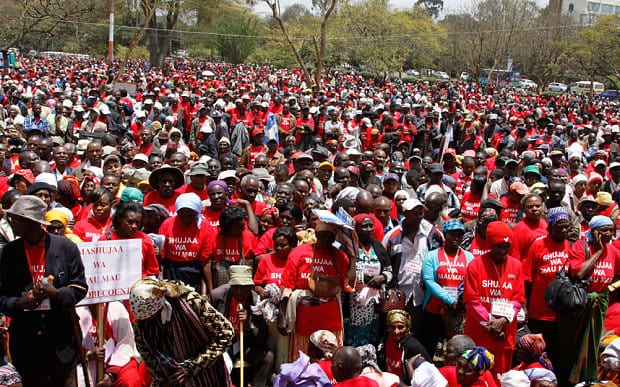 Two years after agreeing to pay Mau Mau veterans for the human rights abuses they suffered during colonial rule, the British government have unveiled a monument honoring the freedom fighters at Nairobi, Kenya’s Uhuru Park.
Two years after agreeing to pay Mau Mau veterans for the human rights abuses they suffered during colonial rule, the British government have unveiled a monument honoring the freedom fighters at Nairobi, Kenya’s Uhuru Park.
SEE ALSO: Homo Naledi: SA’s Clergy Reject Theory That Africans Come from Apes
Keep Up With Face2Face Africa On Facebook!
Colonial Oppression & Exploitation
The first White settler to arrive in Kenya was in 1902. At the time, the British had one goal in mind: seize as much land as possible so that the new settlers’ economy could pay for Uganda’s newly constructed railway system.
By 1925, the British East Africa Commission would conclude that Kenya had “some of the richest agricultural soils in the world, mostly in districts where the elevation and climate make it possible for Europeans to reside permanently.”
Between 1902 and 1932, Europeans would seize 7 million acres of land from Kenyans, with the Kikuyu, Masai, and Nandi tribes being the most deeply affected by the land grab who — like the Native Americans during the 17th century in North America — were forced to live on land reserves.
But the British’s actions weren’t isolated to land takeovers. In fact, in order to make profits, they needed cheap labor to work their confiscated lands. Therefore, Kenyans were forced to work on the very land they used to own.
The British also instituted a pass system, kipande, very similar to the one South African’s would be subjected to during Apartheid.
By the time the Mau Mau Uprising would occur in 1952, Kenyans would have already waged the Nandi Revolt (1895-1905), the Giriama Uprising (1913-1914), the Women’s Revolt (1947), and the Kalloa Affray (1950).
None of the uprisings would prove successful.
The Mau Mau Emerge
By 1952, a state of emergency was declared in Kenya due to an uprising. British troops were immediately sent to the East African nation, with large groups of people being hanged and another 150,000 Kikuyu detained.
The Mau Mau rebels — based in the Mt. Kenya and Aberdares forests as well as Nairobi — would strike again on March 26,1953, when they would attack loyalist Home Guard families in a massacre in Lari.
About 74 people would be killed and another 54 would be injured. The British would respond again with the killing of 400 Kenyans.
But those deaths would be just the tip of the iceberg: In all, according to the Kenyan Human Rights Commission, 90,000 Kenyans were executed, tortured, or maimed, while 160,000 were kept in horrific conditions.
By October 21, 1956, Mau Mau rebel leader Dedan Kimathi would be captured, signaling the end of the uprising.
But the rebellion is recognized as being instrumental to Kenya achieving its independence by December 12, 1963.
Not surprisingly, the role of the British — and its myriad number of war crimes against the people — would continue to endure as a dark cloud in Kenya’s past.
By 2011, after years of Mau Mau veterans bringing human rights abuses against the British, the British, who had previously said they couldn’t be held responsible for what occurred, decided to acknowledge four claimants who had “arguable cases in law.”
Their lawyers allege Paulo Muoka Nzili was castrated, Wambuga Wa Nyingi was severely beaten and Jane Muthoni Mara was subjected to appalling sexual abuse in detention camps during the rebellion. A fourth claimant, Ndiku Mutwiwa Mutua, died last year [2012].
That case would lead to 5,228 victims receiving payments totaling £19.9m, which breaks down to roughly £3,000 per victim, starting in 2013.
At the time of the payout decision, British Foreign Secretary William Hague said, “I would like to make clear now, and for the first time, on behalf of Her Majesty’s government, that we understand the pain and grievance felt by those who were involved in the events of the emergency in Kenya.
“The British government recognises that Kenyans were subject to torture and other forms of ill-treatment at the hands of the colonial administration.
“The British government sincerely regrets that these abuses took place and that they marred Kenya’s progress towards independence.”
As a part of the payout agreement, Hague also said that Britain would create a permanent memorial to the Mau Mau.
On September 12th, 2015, the memorial was finally unveiled — displaying a Mau Mau fighter receiving food from a woman — before thousands of Mau Mau veterans (pictured).
Watch the memorial unveiling here:
SEE ALSO: White African Says Skin Color Has Given Him ‘Outsider’ Status on the Continent











